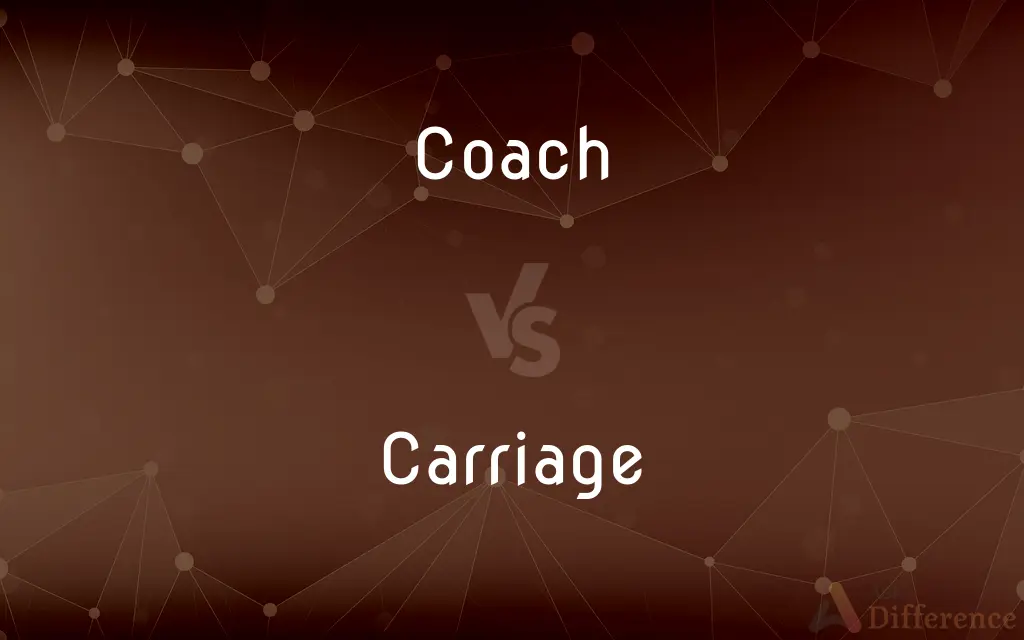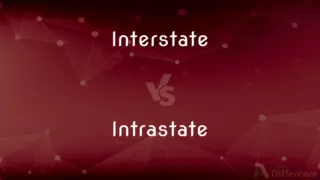Coach vs. Carriage — What's the Difference?
By Maham Liaqat & Fiza Rafique — Updated on March 28, 2024
A coach is a type of vehicle designed primarily for transporting passengers, often long distance, whereas a carriage is traditionally a horse-drawn vehicle used for both personal and ceremonial transport.

Difference Between Coach and Carriage
Table of Contents
ADVERTISEMENT
Key Differences
Coaches are modern vehicles equipped with amenities designed for comfort during longer journeys, including seating, storage, and sometimes restroom facilities. Carriages, on the other hand, evoke a sense of tradition and history, often lacking the comfort and speed of modern coaches but offering a unique, often luxurious experience.
Coaches are integral to public transportation systems, providing an accessible way for people to travel between cities or countries. Carriages, while not commonly used for everyday transport, still play a role in special events, tourism, and historical reenactments, highlighting their cultural significance.
While coaches are powered by engines, making them suitable for longer distances and varying terrains, carriages rely on the strength of animals, limiting their speed and the distance they can comfortably travel. This difference in propulsion reflects the evolution of transportation technology.
Safety features and regulations for coaches are stringent, given their role in public transportation, including seat belts and accessibility features. Carriages, given their more ceremonial or recreational use, adhere to different standards, focusing on the welfare of the animals and the safety of passengers in a more controlled environment.
The design of coaches is driven by functionality, efficiency, and passenger comfort, with advancements in technology continuously improving these aspects. Carriages, however, maintain a design that honors historical accuracy and aesthetic appeal, with less emphasis on evolving for efficiency or comfort.
ADVERTISEMENT
Comparison Chart
Primary Use
Long-distance passenger transport
Ceremonial, historical, and leisure activities
Propulsion
Engine-powered
Horse-drawn
Modern Relevance
Integral to public and private transport systems
Mainly for tourism and special events
Comfort and Amenities
High, with seats, restrooms, and storage
Varies, generally lower except in luxury models
Safety Regulations
Strict, with a focus on passenger safety
Focuses on animal welfare and basic safety
Compare with Definitions
Coach
A coach is a large motor vehicle for transporting passengers.
We took an overnight coach to reach the city.
Carriage
A carriage is a horse-drawn vehicle used for transport.
They rode in a carriage through the park.
Coach
Modern coaches are equipped with amenities like Wi-Fi and restrooms.
The coach had free Wi-Fi, making the journey pleasant.
Carriage
Historical tours sometimes use carriages to give a sense of the past.
The carriage tour of the old town was fascinating.
Coach
Coaches are often used for group travel or tours.
The tour group boarded the coach for the city tour.
Carriage
Carriage rides are popular in tourist spots for leisurely sightseeing.
They enjoyed a leisurely carriage ride around the lake.
Coach
The coach industry has evolved to include luxury and sleeper coaches.
She opted for the luxury coach with reclining seats for her trip.
Carriage
Luxury carriages are crafted with exquisite detail for elegance.
The royal carriage was adorned with gold trim and red velvet.
Coach
Coaches serve as long-distance public transportation.
Booking early can get you cheaper tickets on the coach.
Carriage
Carriages often feature in weddings and ceremonial events.
The bride arrived in a beautiful white carriage.
Coach
A bus, especially one designed for long-distance passenger service.
Carriage
A carriage is a private four-wheeled vehicle for people and is most commonly horse-drawn. Second-hand private carriages were common public transport, the equivalent of modern cars used as taxis.
Coach
A railroad passenger car.
Carriage
A wheeled vehicle, especially a four-wheeled horse-drawn passenger vehicle, often of an elegant design.
Coach
A closed automobile, usually with two doors.
Carriage
Chiefly British A railroad passenger car.
Coach
A large, closed, four-wheeled carriage with an elevated exterior seat for the driver; a stagecoach.
Carriage
A baby carriage.
Coach
Coach class.
Carriage
A wheeled support or frame for carrying a heavy object, such as a cannon.
Coach
(Sports) A person who trains or directs athletes or athletic teams.
Carriage
A moving part of a machine for holding or shifting another part
The carriage of a typewriter.
Coach
A person who gives instruction or guidance
An acting coach.
A life coach.
Carriage
The act or process of transporting or carrying.
Coach
A private tutor employed to prepare a student for an examination.
Carriage
(kărē-ĭj) The cost of or the charge for transporting.
Coach
To train or tutor or to act as a trainer or tutor.
Carriage
The manner of holding and moving one's head and body; bearing.
Coach
To transport by or ride in a coach.
Carriage
(Archaic) Management; administration.
Coach
A wheeled vehicle, generally drawn by horse power.
Carriage
The act of conveying; carrying.
Coach
A passenger car, either drawn by a locomotive or part of a multiple unit.
Carriage
Means of conveyance.
Coach
A trainer or instructor.
Carriage
A (mostly four-wheeled) lighter vehicle chiefly designed to transport people, generally drawn by horse power.
The carriage ride was very romantic.
Coach
A long-distance, or privately hired, bus.
Carriage
A railroad car
Coach
(nautical) The forward part of the cabin space under the poop deck of a sailing ship; the fore-cabin under the quarter deck.
Carriage
The manner or posture in which one holds or positions a body part, such as one's arm or head.
The runner has a very low arm carriage.
Coach
The part of a commercial passenger airplane or train reserved for those paying the lower standard fares; the economy section.
We couldn't afford the good tickets, so we spent the flight crammed in coach.
Carriage
A manner of walking and moving in general; how one carries oneself, bearing, gait.
Coach
The lower-fare service whose passengers sit in this part of the airplane or train; economy class.
Carriage
(archaic) One's behaviour, or way of conducting oneself towards others.
Coach
To train.
Carriage
The part of a typewriter supporting the paper.
Coach
(transitive) To instruct; to train.
She has coached many opera stars.
Carriage
A shopping cart.
Coach
(intransitive) To study under a tutor.
Carriage
(British) A stroller; a baby carriage.
Coach
(intransitive) To travel in a coach (sometimes coach it).
Carriage
The charge made for conveying (especially in the phrases carriage forward, when the charge is to be paid by the receiver, and carriage paid).
Coach
(transitive) To convey in a coach.
Carriage
(archaic) That which is carried, baggage
Coach
Via the part of a commercial passenger airplane or train reserved for those paying the lower standard fares; via the economy section.
John flew coach to Vienna, but first-class back home.
Carriage
That which is carried; burden; baggage.
David left his carriage in the hand of the keeper of the carriage.
And after those days we took up our carriages and went up to Jerusalem.
Coach
A large, closed, four-wheeled carriage, having doors in the sides, and generally a front and back seat inside, each for two persons, and an elevated outside seat in front for the driver.
Carriage
The act of carrying, transporting, or conveying.
Nine days employed in carriage.
Coach
A special tutor who assists in preparing a student for examination.
Wareham was studying for India with a Wancester coach.
Carriage
The price or expense of carrying.
Coach
A cabin on the after part of the quarter-deck, usually occupied by the captain.
The commanders came on board and the council sat in the coach.
Carriage
That which carries of conveys,
Coach
A first-class passenger car, as distinguished from a drawing-room car, sleeping car, etc. It is sometimes loosely applied to any passenger car.
Carriage
The manner of carrying one's self; behavior; bearing; deportment; personal manners.
His gallant carriage all the rest did grace.
Coach
One who coaches;
Carriage
The act or manner of conducting measures or projects; management.
The passage and whole carriage of this action.
Coach
To convey in a coach.
Carriage
A railcar where passengers ride
Coach
To prepare for public examination by private instruction; to train by special instruction.
I coached him before he got his scholarship.
Carriage
A vehicle with four wheels drawn by two or more horses
Coach
To drive or to ride in a coach; - sometimes used with
Carriage
Characteristic way of bearing one's body;
Stood with good posture
Coach
(sports) someone in charge of training an athlete or a team
Carriage
A machine part that carries something else
Coach
A person who gives private instruction (as in singing or acting)
Carriage
A small vehicle with four wheels in which a baby or child is pushed around
Coach
A railcar where passengers ride
Coach
A carriage pulled by four horses with one driver
Coach
A vehicle carrying many passengers; used for public transport;
He always rode the bus to work
Coach
Teach and supervise (someone); act as a trainer or coach (to), as in sports;
He is training our Olympic team
She is coaching the crew
Coach
Drive a coach
Common Curiosities
Do both coaches and carriages require special licenses to operate?
Yes, both require operators to have specific licenses, focusing on safety and, for carriages, animal welfare.
Are coaches considered more comfortable than carriages?
Generally, yes, as coaches are designed for long-distance travel with amenities for comfort.
How have coaches evolved over time?
Coaches have evolved from simple, horse-drawn vehicles to modern, engine-powered vehicles with various amenities.
What distinguishes a coach from a carriage?
A coach is engine-powered and designed for longer distances, while a carriage is horse-drawn, often used for special occasions or tours.
Can carriages be found in modern cities?
Yes, carriages are often used in modern cities for tourism, weddings, and special events.
Do modern coaches offer accessibility features?
Yes, modern coaches are designed with accessibility features for passengers with disabilities.
Are there luxury options available for both coaches and carriages?
Yes, both coaches and carriages offer luxury options, though they cater to different experiences.
Is there a difference in the cost of traveling by coach versus carriage?
Yes, carriage rides are often more expensive and seen as a luxury or recreational activity, while coach travel is more budget-friendly.
How does the experience of traveling by coach compare to carriage?
Traveling by coach is more about efficiency and comfort over long distances, whereas carriage rides offer a historical or romantic experience.
Can carriages be used for long-distance travel?
Due to their reliance on animal propulsion, carriages are not suitable for long distances compared to coaches.
How do safety standards differ between coaches and carriages?
Coaches adhere to strict safety regulations for vehicles, while carriage safety focuses on animal welfare and passenger security.
What types of events are carriages commonly used for?
Carriages are popular for weddings, parades, historical reenactments, and tourism.
What role do coaches play in public transportation?
Coaches are crucial for intercity travel, offering an affordable and efficient means of transportation.
Can carriage rides be found outside of city centers?
Yes, carriage rides are also popular in rural areas, parks, and tourist attractions, offering scenic views.
How does the maintenance of a coach compare to that of a carriage?
Maintenance for coaches involves mechanical upkeep and safety checks, while carriage maintenance focuses on the vehicle and the health and well-being of the horses.
Share Your Discovery

Previous Comparison
Auscult vs. Auscultation
Next Comparison
Interstate vs. IntrastateAuthor Spotlight
Written by
Maham LiaqatCo-written by
Fiza RafiqueFiza Rafique is a skilled content writer at AskDifference.com, where she meticulously refines and enhances written pieces. Drawing from her vast editorial expertise, Fiza ensures clarity, accuracy, and precision in every article. Passionate about language, she continually seeks to elevate the quality of content for readers worldwide.















































